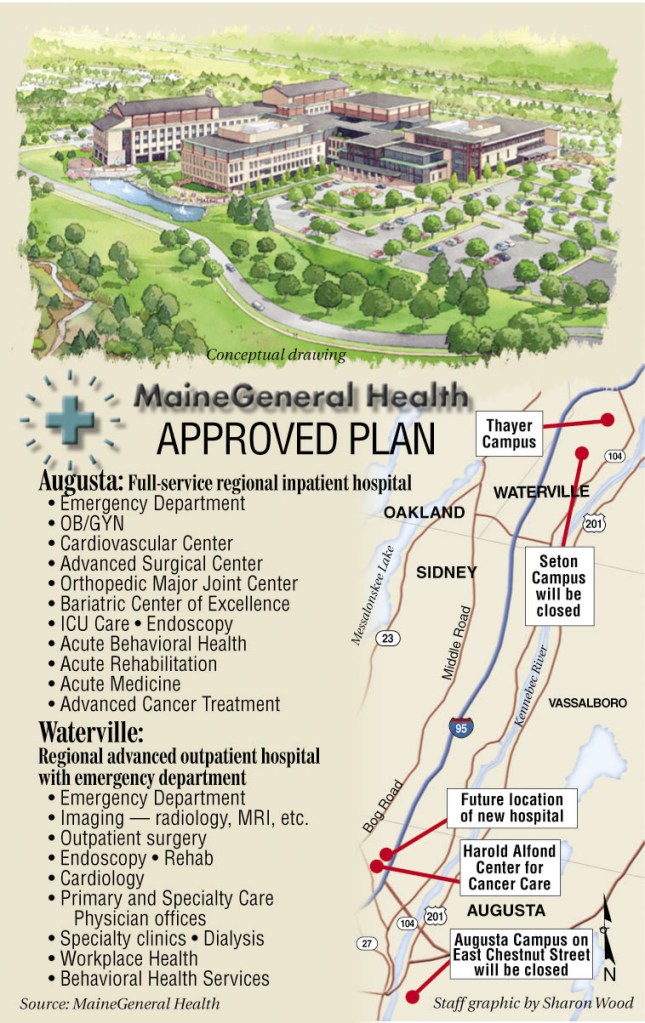AUGUSTA — People are using MaineGeneral Medical Center facilities less than the company had predicted, so the central Maine hospital system has fewer patients to treat and less money coming in.
That means people are either healthier, managing their health better or simply not going to the local hospital for needed care, MaineGeneral officials say.
Whatever the reason, the trend has put a dent in the hospital system’s finances as it continues an expensive project to consolidate its in-patient services at a new regional hospital.
The system’s operating income has been almost halved for the first five months of its fiscal year. The hospital system expected $4.75 million and brought in $2.4 million, according to MaineGeneral Health President Scott Bullock.
Despite the financial letdown, MaineGeneral’s plans to construct a $310 million regional hospital near Interstate 95’s Exit 113 in north Augusta haven’t been affected, Bullock said.
“The amount borrowed (for the new hospital) is sufficient to build and to pay interest until it opens,” Bullock said. “The people who loaned us the money want to be absolutely certain that the hospital is built.”
The regional hospital will have 192 patient beds, each in private rooms, and replace in-patient hospitals at the Thayer Campus in Waterville and South Chestnut Street in Augusta.
Cost-cutting measures
Part of the plan to make up the revenue shortfall is a loss of “earned time” for two pay periods for all MaineGeneral workers, and three pay periods for senior management and administrators. That cost-cutting measure is estimated to reduce expenses by $1.5 million.
Those details are outlined in a recent memo Bullock sent to the 3,800-plus workers at MaineGeneral facilities. At MaineGeneral and its affiliates, earned time comprises hours that can be used for vacation, holiday and sick time.
In addition, hospital administrators have carved another $3.5 million from the budget.
Four years ago, MaineGeneral took similar action to plug a $500,000 hole, suspending earned time for one pay period for all employees and two pay periods for senior vice presidents.
But the circumstances were far different, Bullock said.
“Now we’re trying to maintain a very strong financial position,” Bullock said. “Four years ago we were trying to dig out of significant hole. Having a new hospital under construction and changes in environment make it important for us to act quickly rather than wait. We need to keep our current healthy financial performance, making sure each year we achieve our budgeted operating margins.”
In the memo, Bullock listed reasons for the recent decrease in income:
• the impact of a struggling economy;
• changes in treatment protocol, primarily in cancer treatment; and
• efforts to improve health care treatment, reduce re-admissions and redirect some patients to primary or urgent care facilities, instead of the more expensive emergency departments.
Tough times for hospitals
Steven Michaud, president of the Maine Hospital Association, said hospitals across the state and the country are still reeling from “very substantial reductions in the use of hospital services,” since the Great Recession.
“We thought it must be people struggling financially, and we figured it would come back at some point, but we’ve never really seen it come back,” Michaud said. “It’s an interesting and puzzling thing we’ve seen. We think it’s a combination of things, with the economic climate — you’re going to put it (care) off, if you can.”
In addition, hospitals are increasingly working to keep people healthier through disease management and preventative measures, he said.
“It’s certainly a good thing, but it means (Maine hospitals’) volume is down,” Michaud said. “So, they (MaineGeneral) are not alone. It’s a nationwide effect.”
Bullock said hospital administrators opted to impose the earned-time suspensions across the board.
“We tried to be as fair as we could,” he said. “People are adjusting, but it’s never easy. There are always some people affected more than others. We all have to remember that this is a very difficult time for people who work at MaineGeneral and throughout the region, whether it comes to buying gas at the station or groceries at the store.
“We recognize many of our people are struggling to make ends meet. I think everybody’s budget is stretched.”
The hospital is also anticipating future revenue shortfalls from state funding for hospitals.
Now, the Legislature is mulling changes that would cut MaineGeneral’s payments by $10.5 million in the 2013 fiscal year. “We know some significant portion of those cuts will be approved,” Bullock said.
In the memo, Bullock offered employees advice to boost revenues by continuing to recruit and retain physicians and by keeping referrals within the MaineGeneral system.
“One in three people in the region we serve is going elsewhere for inpatient services we provide at MaineGeneral,” Bullock said, adding that a shift to one in four would increase revenue by $12 million.
MaineGeneral administrators have said the health care system serves a region of 180,000 people.
Bullock refers in his memo to a national news story published recently about how medical testing recommendations are routinely ignored and tests are often administered without good reason.
Also, federal analysts report slower growth in health care nationally over the past two years.
“We’re being encouraged by all the people that fund our care, people, employers and governments, to do whatever we can to make the value of health care as high as possible,” Bullock said.
Bullock said the hospital has worked on reducing re-admissions for chronic diseases and reducing the use of the emergency department. MaineGeneral has set up an express care facilities at Elmwood Primary Care, 211 Main St., Waterville; and at Augusta Family Medicine at 15 Enterprise Drive in Augusta, to provide care for people who previously would have accessed emergency rooms.
“Some of those things have collectively slowed the rate of growth of health care costs and utilization,” Bullock said.
Betty Adams — 621-5631
badams@centralmaine.com
Send questions/comments to the editors.




